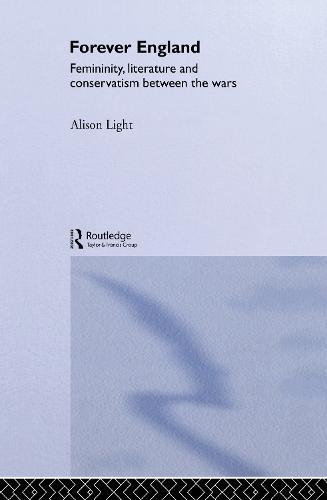Overview
Most studies of the interwar years have focussed upon literary elites, rendering that past and its literature in almost exclusively male terms. In Forever England Alison Light argues that we cannot make sense of Englishness in the period, or understand the changes within literary culture, unless we recognise the extent to which the female population represented the nation between the wars. From the traumatic aftermath of the First World War, Forever England traces the making of a conservative national temperament which could be defensive and protective, yet modernising in outlook. In a series of literary anaylses, the author suggests some of the tones and accents of this new version of Englishness; in particular she looks at new kinds of readership and fiction, at the historical and emotional significance of the whodunit', the burgeoning of historical romance, and the creation of a middlebrow culture in the period. Forever England evokes a powerful sense of period and of the pleasures of reading, providing an intimate picture of interwar life from inside the English middle classes. As a feminist inquiry, it argues from a different kind of social and political history; one which makes connections between the interior structures of private life and their more public national forms. Controversially, it also urges that feminism deal with conservative, as well as radical, desires and their place in women's lives.
Full Product Details
Author: Alison Light
Publisher: Taylor & Francis Ltd
Imprint: Routledge
Dimensions:
Width: 15.60cm
, Height: 1.80cm
, Length: 23.40cm
Weight: 0.566kg
ISBN: 9780415016612
ISBN 10: 0415016614
Pages: 300
Publication Date: 07 November 1991
Audience:
College/higher education
,
General/trade
,
Tertiary & Higher Education
,
General
Format: Hardback
Publisher's Status: Active
Availability: In Print

This item will be ordered in for you from one of our suppliers. Upon receipt, we will promptly dispatch it out to you. For in store availability, please contact us.
Reviews
"."" . . scrupulously researched, and fluently and lovingly written. It is original and imaginative, and will come to occupy a seminal place in cultural history."" -Angela McRobbie, ""New Statesman and Society ""[T]his beautifully written book brilliantly demonstrates that a ""woman-centered"" perspective on the world does not guarantee that it will be radical."" -Elizabeth Wilson, ""The Guardian ""As light remarks in her introduction, feminist criticism has tended to dismiss the inter-war years as a kind of benighted age when women stoo still or even fell back, socially and politically, a dead period between the first and second waves of feminism. ""Forever England gives us reasons to reevaluate the lives and the acheivements of women during this era and thereby opens up a fascinating and rewarding new area for feminist researchm in the United States as well as in Great Britain."" -""Women's Review of Books"
."" . . scrupulously researched, and fluently and lovingly written. It is original and imaginative, and will come to occupy a seminal place in cultural history."" -Angela McRobbie, ""New Statesman and Society ""[T]his beautifully written book brilliantly demonstrates that a ""woman-centered"" perspective on the world does not guarantee that it will be radical."" -Elizabeth Wilson, ""The Guardian ""As light remarks in her introduction, feminist criticism has tended to dismiss the inter-war years as a kind of benighted age when women stoo still or even fell back, socially and politically, a dead period between the first and second waves of feminism. ""Forever England gives us reasons to reevaluate the lives and the acheivements of women during this era and thereby opens up a fascinating and rewarding new area for feminist researchm in the United States as well as in Great Britain."" -""Women's Review of Books
. . . scrupulously researched, and fluently and lovingly written. It is original and imaginative, and will come to occupy a seminal place in cultural history. <br>-Angela McRobbie, New Statesman and Society <br> [T]his beautifully written book brilliantly demonstrates that a woman-centered perspective on the world does not guarantee that it will be radical. <br>-Elizabeth Wilson, The Guardian <br> As light remarks in her introduction, feminist criticism has tended to dismiss the inter-war years as a kind of benighted age when women stoo still or even fell back, socially and politically, a dead period between the first and second waves of feminism. Forever England gives us reasons to reevaluate the lives and the acheivements of women during this era and thereby opens up a fascinating and rewarding new area for feminist researchm in the United States as well as in Great Britain. <br>- Women's Review of Books <br>
. . . scrupulously researched, and fluently and lovingly written. It is original and imaginative, and will come to occupy a seminal place in cultural history. -Angela McRobbie, New Statesman and Society [T]his beautifully written book brilliantly demonstrates that a woman-centered perspective on the world does not guarantee that it will be radical. -Elizabeth Wilson, The Guardian As light remarks in her introduction, feminist criticism has tended to dismiss the inter-war years as a kind of benighted age when women stoo still or even fell back, socially and politically, a dead period between the first and second waves of feminism. Forever England gives us reasons to reevaluate the lives and the acheivements of women during this era and thereby opens up a fascinating and rewarding new area for feminist researchm in the United States as well as in Great Britain. - Women's Review of Books




